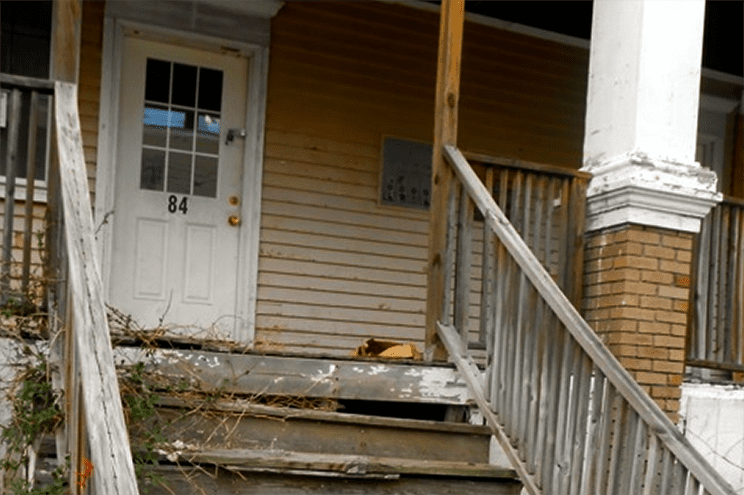A solicitation of briefs from Maine’s highest court has legal aid providers worried that long-standing rulings protecting the poor from repeat foreclosure attempts could be upended amid the housing crisis.
For 25 years, Maine’s legal precedent has barred lenders from suing borrowers multiple times for defaulted loans when they ask for repayment all at once — called accelerating a note — if their case is dismissed with prejudice under state law. That precedent was upheld by the Maine Supreme Judicial Court in two 2017 cases, Fannie Mae v. Deschaine and Pushard v. Bank of America.
But the law court looks to be reconsidering its precedent. In a request for amicus briefs in the mortgage case J.P. Morgan Acquisition Corp. v. Camille Moulton, the court asked interested parties to weigh in on two questions: whether it should revisit its precedent on barring second foreclosure attempts altogether, and whether it should reverse its holdings in Deschaine and Pushard.
It sets up a David and Goliath case, with some of the country’s biggest financial service providers and Maine banking interests filing to weigh in on the case this Wednesday. The questions have stirred fear among legal aid providers that the protections borrowers have could disappear and create more foreclosures as Maine struggles with low housing stock and high prices.
Chief among those concerned is Thomas Cox, a Maine lawyer who exposed a national scandal of “robo-signing” — a practice of signing off on foreclosure documents without reading what they said — at GMAC Mortgage and other lenders in the wake of the 2008 financial crisis.
Cox and other advocates fear that a reversal of the precedents could create a situation where homeowners face multiple attempts to foreclose on their homes, which most poor people would lack the financial resources to defend against and would lead them to eventually lose their homes.
“Depending on how the court rules, [my clients] could face another foreclosure,” he said. “It will be like the first case never happened.”
Among those who have filed include mortgage backers Fannie Mae and Freddie Mac; the Federal Housing Finance Agency; the Maine Credit Union League; the Maine Bankers Association; the banking attorneys association USFN; default and foreclosure-focused Maine firm Doonan, Graves & Longoria LLC; Pine Tree Legal Assistance; Maine Equal Justice and the National Consumer Law Center, which Cox provides legal counsel for. The state of Maine is not getting involved in the case, according to the Attorney General’s Office.
The central case, J.P. Morgan v. Moulton, hinges on whether the South Paris District Court determined correctly in 2021 that the lending giant failed to correctly provide Moulton with a notice to default and a right to make up the payments before pursuing foreclosure. The notice requires those seeking recuperation to provide an itemized list of missed payments and a total amount to bring the borrower into compliance with the loan – something J.P. Morgan argues in its Supreme Judicial Court appeal it did not need to do. Moulton, a Buckfield resident, was determined to hold the title to her property and awarded her attorney’s fees and costs.
Amicus briefs were not available to be reviewed at the court on Thursday; a clerk told a reporter to ask the law firms for the documents. Most of the banking, credit and lending associations either declined or did not respond to a request for comment.
But their briefs make it clear they want to see the precedent change.
The Maine Bankers Association’s brief calls the $41 billion industry the “economic engine” of the state and says a substantial number of the mortgage loans members make is through their payments. It called for the court to allow lenders to try for a second foreclosure if a borrower defaults again.
Jim Roche, the president of the Maine Bankers Association, said the court’s prior rulings have put Maine out of step with the rest of the country. He described the laws as awarding borrowers a “free house” because foreclosure attempts can be thrown out in the event of a math error or administrative mistakes, and banks are not given the chance to correct those actions.
“In the current case, we hope the court will return Maine law to a more balanced, mainstream position that evenhandedly recognizes the rights of both consumers and financial institutions,” he said.
Allowing lenders to escape foreclosure hurts the economic soundness of the lender, attorneys from Fannie Mae, Freddie Mac and the Federal Housing Finance Agency argued in a joint brief. The rule can also have consequences beyond one home such as making credit more expensive for future home buyers because it makes the overall cost and return on a mortgage uncertain.
But Frank D’Alessandro, the legal director of Maine Equal Justice, argued in a brief that it should be up to the Legislature to change the underlying law that governs the foreclosure process because it has passed statutes based on the court’s prior rulings.
A reversal could be particularly stressful as Maine’s housing crisis escalates, said Deb Ibonwa, a policy and legal advocate with Maine Equal Justice. She said the current precedent can give some peace of mind to poor homeowners by allowing them to focus on paying other bills without fear of losing their homes.
“This is coming at a time when people can barely afford to keep a roof over their heads,” she said.
Andrea Bopp Stark, who filed a brief for the National Law Consumer Center, said there seems to be no reason why the court should consider to overturn Deschaine and Pushard given how long they have gone unchallenged.
“It doesn’t seem right that we should have to do this again,” she said.
The court’s composition has changed since the precedent was affirmed in 2017, with Gov. Janet Mills filling four of the seven positions during her term. One appointee, Associate Justice Catherine Connors, previously worked for Pierce Atwood and co-authored a brief for the Maine Bankers Association in the Deschaine cause; in Pushard, she represented Bank of America.
Connors, in her January 2020 confirmation hearing, stressed that she would recuse herself if she was ever faced with a case concerning a previous client. But no recusals have been made so far, according to Maine Judicial Branch spokesperson Barbara Cardone. She said the court does not discuss reasons for recusals or speculate on whether they will occur.
The framing of the questions does not seem to bode well for Moulton’s case, said Kendall Ricker of Boothy, Silver & Ricker, who represents the defendant in the case at hand. But he said it did not necessarily mean precedent would be overturned, or should not be considered.
“It is also true that there are aspects of the foreclosure law that would benefit from further clarification by the Court,” he said.
Caitlin Andrews covers state politics and general assignment stories for The Maine Monitor. Reach her with other story ideas at gro.r1751328110otino1751328110menia1751328110meht@1751328110nilti1751328110ac1751328110. Use this link to submit leads on potential stories anonymously.








